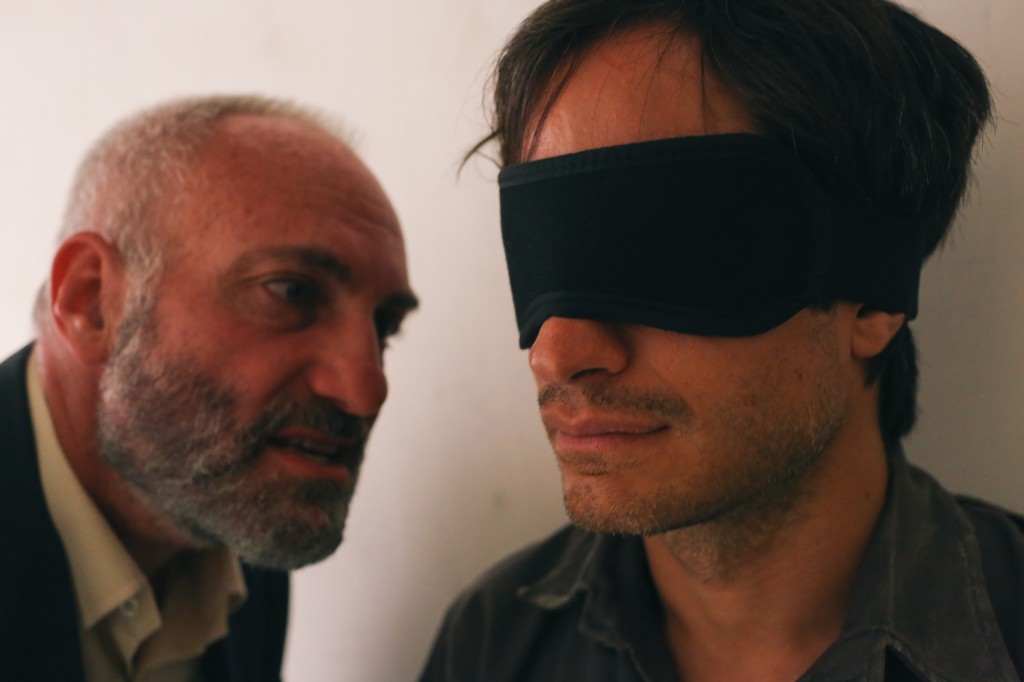Stewart’s ‘Rosewater’: A Great Story, Brilliantly Told
- Like
- Digg
- Del
- Tumblr
- VKontakte
- Buffer
- Love This
- Odnoklassniki
- Meneame
- Blogger
- Amazon
- Yahoo Mail
- Gmail
- AOL
- Newsvine
- HackerNews
- Evernote
- MySpace
- Mail.ru
- Viadeo
- Line
- Comments
- Yummly
- SMS
- Viber
- Telegram
- Subscribe
- Skype
- Facebook Messenger
- Kakao
- LiveJournal
- Yammer
- Edgar
- Fintel
- Mix
- Instapaper
- Copy Link
If it weren’t for Jon Stewart I don’t think I’d have any reason left. You see, there’s not a day that goes by when I don’t read the daily papers and find myself thinking: “Okay, it’s finally happened. That thin cable which holds the funicular of my rationality, dangling above the chasm of my insanity, has snapped.” But then I catch the latest episode of Stewart’s “The Daily Show” and my descent into the abyss is arrested. I see that someone else has not only noticed the hypocrisy of our elected officials, but has the wherewithal to make funny jokes about it. And back I crawl toward the sunlight.
So I’m almost afraid to tell you how much I enjoyed Rosewater—Stewart’s feature-film directorial debut—because if this movie is a hit, he may pack it in “Daily Show”-wise and take up directing full time. Which means I’ll have to make a reservation at the nearest cork-lined room. But if I must suffer so you can see a good movie, well I guess that’s just too damn bad for me.
A Tortuous True Story (But Not a Tortured Film)
Rosewater is based on the book And Then They Came for Me by Maziar Bahari, about his experience of being held captive in an Iranian prison for 118 days after that country’s deeply contested election in 2009.
At the time, Bahari, a London-based Iranian-born journalist, was covering the election for Newsweek, but the Bahari family’s relationship with Iran’s government was already extremely problematic. His father had been imprisoned in the 1950s under the Shah for being a communist. His sister had been imprisoned in the 1980s under the Ayatollah for the same thing. In 2009 Bahari had been interviewing people not sanctioned by the government and filming scenes of brutal repression, when one morning he was taken to Evin Prison and put through four months of interrogation. A global campaign to free Bahari finally forced the government to release him.
Stewart became involved because of a piece that Jason Jones, a “correspondent” for “The Daily Show,” did prior to the election in which he interviewed Bahari. The gimmick of the segment was that Jones pretended to be an American spy getting state secrets from various sources … including Bahari. At one point, during his ordeal, his captors played the “Daily Show” interview demanding to know why Bahari was meeting with U.S. spies—even though Jones is a Canadian comic.
The film’s events take place in a turbulent setting. Iran’s incumbent president, Mahmoud Ahmadinejad, was up for re-election in 2009, and when vote tallies were announced that showed he had won, many Iranians suspected a fix and massive protests erupted. The first part of the movie follows Bahari (played by Gael Garcia Bernal) on his travels around Tehran interviewing supporters of Mir Hossein Mousavi, the chief opposition candidate. After that the film becomes a two-character drama as we watch Bahari’s interrogation by his torturer, known only as “Rosewater” because he is always dousing himself with that scent.
My big fear is that the above synopsis might turn you away from seeing this film: “Do I really want to watch someone get tortured?” But that completely misstates the kind of story Rosewater is and, especially, what it’s about.
Mind Games and Emotional Twists in a Twisted Domain
First of all, this isn’t 24-style torture. Mostly it’s Bernal sitting in a chair facing the wall while his captor (played by Danish film star Kim Bodnia) tries to break him down psychologically . When he’s not being questioned, we see Bernal in solitary confinement, using various personal strategies to ward off the despair that the government functionaries are trying to instill.

As Rosewater (Kim Bodnia, L) hammers away at the blindfolded Bahari (Gael Garcia Bernal), the question becomes: Who’s really in the dark here? (Photo by Nasser Kalaji, courtesy of Open Road Films.)
There are certainly moments of sadness in the film but, ultimately, Rosewater is a testament to the indomitability of the human spirit.
The genius of Stewart’s screenplay is that it never goes where you think it will. He (and Bahari) avoid oversimplifications; they do not indulge in hoary tropes of Middle East vs. West, or pristine victims tormented by Axis-of-Evil villains. Rosewater is an exercise in nuance and subtlety, bringing real examination to an issue we may think we know everything about going in.
The intricate emotional gavotte between Bahari and Rosewater is a brilliantly observed and written tale of control and transmutation. Bahari begins his stay in prison at the far end of terrified, while Rosewater looms over him reeking of power. But over the course of the 118 days the balance shifts, and Bahari locates inside himself what he needs to come through.
This is an especially engrossing feature of Rosewater. Many filmmakers would paint Iran’s theocratic government as an Evil Empire and Rosewater as Darth Vader without the pulmonary problem. But that’s too simple a picture and Stewart knows it. While he never excuses or glosses over the hateful aspects of the Iranian government (or justifies them because of American interventions which eventually led to the present regime), his film shows us the human cost of living in that world.
As the interrogation drags on day after day, we begin to understand how warped and stunted Rosewater has become, as a result of the warped and stunted political system in which he is operating. It was Karl Marx’s contention that capitalism carries the seeds of its own destruction; it is Stewart’s message that totalitarianism has a decaying half-life of its own—that a system built on fear and repression can only rot from within until it collapses. Stewart’s script is really rather remarkable.
Never a Dull Moment
As a director, Stewart acquits himself well. The visual style of Rosewater lacks a bit of cohesion, and there’s far too much jittery hand-held camera work for my tastes. But the film continually surprises, and considering its confined milieu, it only feels claustrophobic when Stewart obviously means it to be.
And he has drawn terrific work from his cast. Bernal turns in a low-key and understated performance, expertly charting the enormous emotional and spiritual journey his character travels. Bodnia’s Rosewater is an enthrallingly textured turn— whatever you think he’s going to be, he’s not, and all the performance choices he makes are exactly right.
So go ahead, don’t worry about me. See Rosewater, see it a couple of times even: It’s that intricate. And if it turns out to be a box office smash and Stewart walks away from “The Daily Show,” don’t give me and my problems a second thought. After all, I can still watch Colbert—
Oh. Wait.
Ted Hoover is a Pittsburgh-based writer and critic.
Share on Social Media
- Like
- Digg
- Del
- Tumblr
- VKontakte
- Buffer
- Love This
- Odnoklassniki
- Meneame
- Blogger
- Amazon
- Yahoo Mail
- Gmail
- AOL
- Newsvine
- HackerNews
- Evernote
- MySpace
- Mail.ru
- Viadeo
- Line
- Comments
- Yummly
- SMS
- Viber
- Telegram
- Subscribe
- Skype
- Facebook Messenger
- Kakao
- LiveJournal
- Yammer
- Edgar
- Fintel
- Mix
- Instapaper
- Copy Link
Follow Entertainment Central
Sign up for the EC Newsletter
Latest Stories







